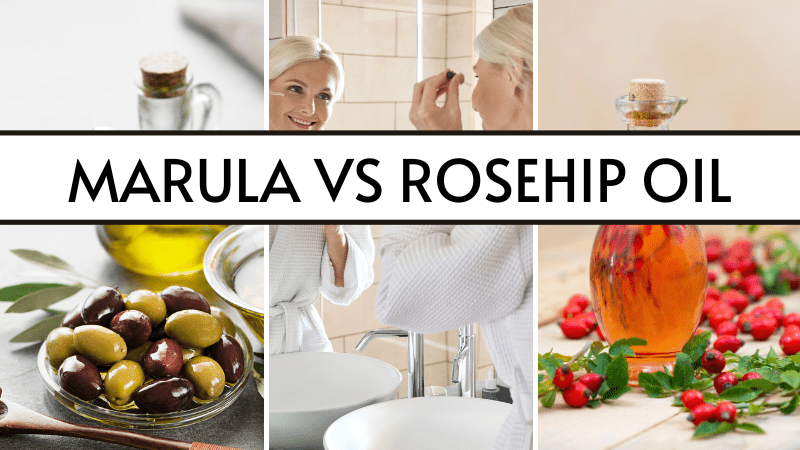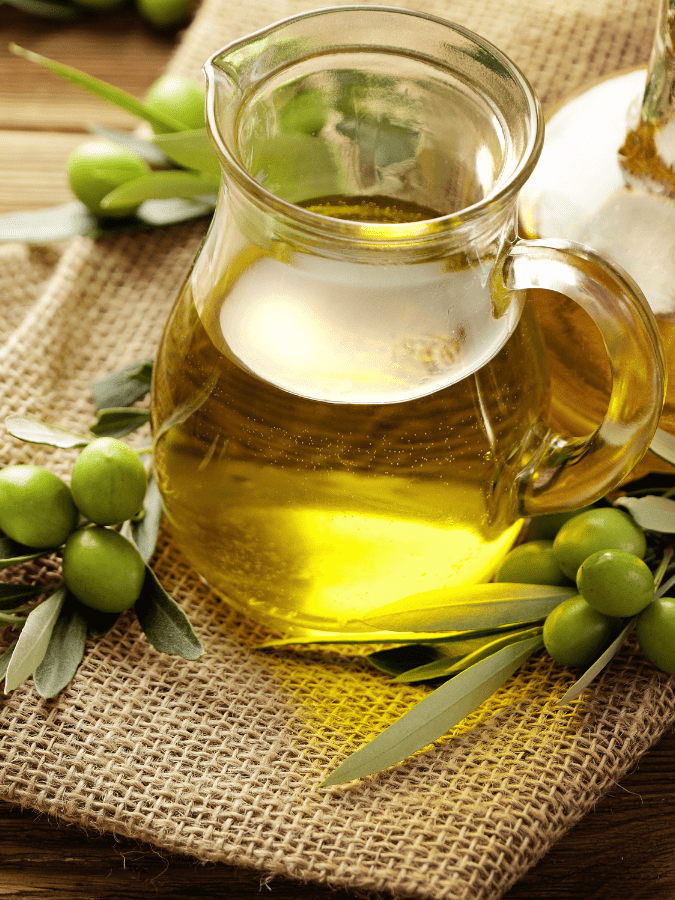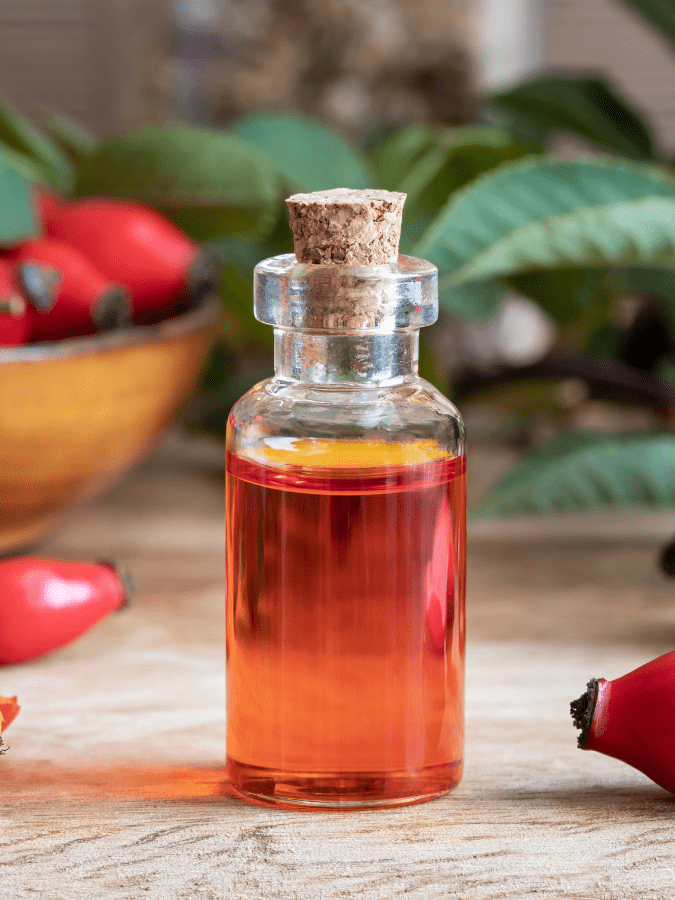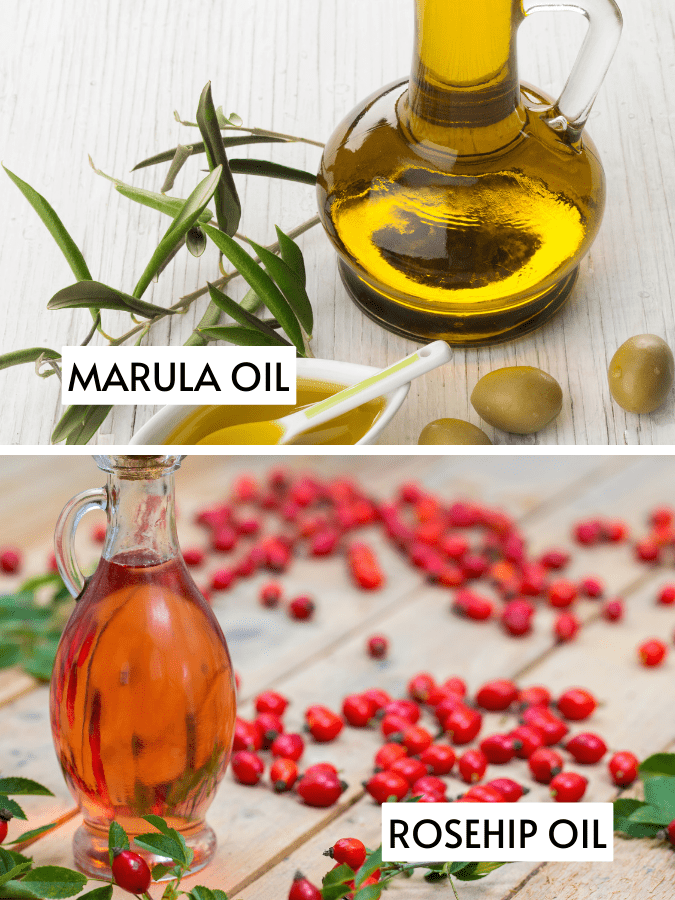The Battle Of The Oils: Marula Vs Rosehip Oil – Which Is Better For You?

I only recommend products I love and I think you will, too. If you click on links I provide, I may receive a little compensation. Learn more.
Have you been trying to figure out which oil is better for your skincare routine and having a hard time deciding between marula oil and rosehip oil? Both oils have been gaining popularity as natural skin care ingredients, but it’s no secret that they have different properties that make them great for different uses.
Let’s break it down and find out which one is right for you!
Which oil is better for you – marula vs rosehip oil?
Everyone’s skin is unique, so it can be difficult to determine which oil is best for you.
That being said, both marula oil and rosehip oil are lovely additions to any skincare routine, but each offers something unique depending on your individual needs. If you’re looking for something rich in antioxidants with anti-inflammatory and moisturizing benefits, then marula oil might be right up your alley; however, if you’re looking to balance sebum production without drying out the skin and delaying signs of aging, then rosehip oil could be a better choice.
Although both these oils have great properties and wonderful uses, if you’re still on the fence about which one is right for you, it never hurts to experiment a bit. Give both a try and see what your body responds best to – after all, you know your skin better than anyone else!
Also, if you want to know a little more about your beloved oils and why and how you must use them, stick around for a while!
What are the differences between marula and rosehip oil
| Property | Marula oil | Rosehip oil |
|---|---|---|
| Source | The kernel of the fruit from the marula tree native to South Africa and Mozambique. | The hip (or seed) of the wild rose bush, primarily grown in Chile. |
| Color | Pale yellow | Red-orange |
| Texture | Light and thin | Thick and sticky |
| Scent | Fruity, nutty aroma | Earthy, slightly sweet scent |
| Benefits | Rich in antioxidants and vitamins A, C & E. It’s highly moisturizing and helps to restore the skin’s natural barrier. | Rich in vitamins A, C & E and essential fatty acids, which can help protect the skin from environmental damage. Also known for its ability to reduce the appearance of scars, wrinkles and stretch marks. |
| Potential side effects | May cause allergic reactions or sensitivity to sunlight in some individuals. | Generally considered safe, though it may cause irritation or sensitivity to sunlight in some people. |
| Best for | Dry skin and hair, as well as aging skin. | Oily and combination skin, as well as acne-prone skin. |
| Usage | Can be used on its own or added to lotions, serums or moisturizers. | Can be used on its own or added to creams, serums and masks. |
| Recommended usage | 1-2 drops daily for the face; a few drops can be applied directly to dry skin and hair. | Apply a thin layer directly on affected areas. |
| Shelf life | Up to 12 months when stored properly. | Up to 24 months when stored properly. |
| Alternatives | Jojoba oil, almond oil, argan oil. | Sea buckthorn oil, evening primrose oil, raspberry seed oil. |
What is marula oil?

Marula oil has become a popular choice due to its high oleic acid content, which helps to moisturize and nourish the skin. It has anti-inflammatory properties that can help reduce redness and irritation, making it great for those with sensitive or acne-prone skin.
It also contains antioxidants like Vitamin C and E, which can help protect against free radical damage. Additionally, it has antibacterial properties that can help keep bacteria from clogging pores and causing breakouts.
What oil is similar to marula oil?
There are quite a few oils that are similar to marula oil, such as argan oil, moringa oil, and Tsubaki oil. All of these oils are known for their hydrating properties and ability to nourish the skin. They also help to improve skin elasticity and reduce the appearance of wrinkles and age spots. If you’re looking for an effective anti-aging treatment, any of these oils would be a good choice.
What is rosehip oil?

Rosehip oil is known for its high levels of linoleic acid, which helps to balance sebum production in the skin. This makes it ideal for those with combination or oily skin who want to regulate their skin’s natural oils without drying out the skin.
It also contains essential fatty acids like omega-3 and omega-6, as well as vitamins A and C, which are all beneficial in promoting healthy cell turnover and reducing signs of aging like wrinkles and dark spots.
What oil is better than rosehip oil?
There are a lot of different oils that are better than rosehip oil, depending on what your individual needs are. Some good options include cacay oil, which has approximately 3 times more vitamin A than rosehip oil; olive oil, which is packed with antioxidants and has anti-inflammatory properties; or argan oil, which is a non-comedogenic oil known for its ability to nourish and revitalize skin and hair.
Who Cannot use rosehip oil?
Even though rosehip oil is pretty gentle on most skin types, pregnant women and breastfeeding mothers should avoid it because of its estrogen-like properties. People with allergies to roses should also steer clear of it, as should those with asthma. Finally, due to the high acid content of rosehip oil, it is not recommended for use on skin that is broken or raw.
Are marula oil and rosehip oil similar?
Well, the short answer is – it depends! Both marula oil and rosehip oil have a lot of similar benefits for your skin, but their composition makes them unique. Marula oil has high levels of oleic acid and linoleic acid, which make it great for deep hydration and nourishment. Rosehip oil is rich in vitamins and fatty acids like linoleic acid and oleic acid, and anti-aging properties that make it great for helping with signs of aging.
So, while they may have some similarities when it comes to their benefits, their composition is different enough that you can get a lot out of each oil, depending on your needs! All the more reason to add both of these powerful oils to your skincare routine! Go ahead and give them both a try – your skin will thank you!
What are the similarities between marula vs rosehip oil?

Rosehip oil is derived from the fruit of the wild rose bush, while marula oil comes from the kernels of the African marula tree. Both oils are rich in vitamins A, C, and E and fatty acids like oleic acid and linoleic acid, which can help promote healthy skin.
They are also both non-comedogenic, meaning they won’t clog your pores. In terms of skincare, both oils can help reduce the appearance of wrinkles, scars, and even hyperpigmentation, while also providing hydration and nourishment to the skin.
They are also both known for their antioxidant properties, which can help protect against environmental damage like sun exposure.
Can I use rosehip and marula oil together?
Absolutely! Rosehip and marula oil are actually a great combo – they both contain essential fatty acids, antioxidants, and vitamins that can help nourish your skin. Just make sure you don’t apply too much or mix them together in the same bottle. Use one after the other for the best results.
How to use each type of oil for the best results?
How To Use Marula Oil
To use marula oil in your skincare routine, simply apply a small amount over the face after cleansing. Allow it to absorb into the skin before adding other moisturizers or sunscreen. This bestseller can also be used as an overnight mask for deeper penetration and will help to give skin an all-over glow without feeling greasy or clogging pores.
Perfect for relieving dryness, marula, with its impressive hydrating properties, is sure to give you beautiful, healthy-looking skin!
How To Use Rosehip Oil
Rosehip oil is also a heavier oil that is best used at night. Squeeze a pea-sized amount into your hand and gently massage it into your skin. Be careful not to overdo it, as this oil can leave behind a bit of a greasy residue.
Rosehip oil can also be added to your bath. Add a few drops to the water to enjoy all the benefits of the oil while you soak in the tub. It is also an excellent spot treatment. If you have a blemish or breakout, dab a bit of the oil on the affected area and leave it overnight.
Not to forget, you can even use this magic potion as a moisturizer. It’s best to apply it in the morning to let the oil settle into your skin for the entire night.
FAQs about marula vs rosehip oil

Does marula oil lighten skin?
There is some anecdotal evidence that marula oil may lighten skin, but there is no scientific research to support this claim. However, marula oil is a rich source of antioxidants and essential fatty acids, which makes it a good choice for skincare products.
What is a good replacement for rosehip oil?
If you’re looking for a cheaper replacement, grapeseed oil is a good option. It has a high smoke point, so it’s great for cooking, and it also has some anti-inflammatory properties.
If you’re looking for a more luxurious replacement, argan oil is a good option. It’s especially beneficial for skin and hair health, and it also has anti-aging properties.
Partying thoughts on marula vs rosehip oil
So there you have it! Both Marula and Rosehip oil are excellent choices for skin care. Both oils have unique properties that can nourish and protect the skin from damage. Marula oil is rich in antioxidants and fatty acids to deeply moisturize the skin, while Rosehip oil is high in vitamin C and essential fatty acids to help reduce the signs of aging. Ultimately, it’s up to individual preference as to which oil works best for their particular skin type.
Related articles to marula vs rosehip oil
- Argan Vs Rosehip Oil, What Should You Use? (You’re Not Ready!)
- Is Olive Oil Comedogenic? Does Olive Oil Clog Pores?
- Refined Vs Unrefined Shea Butter: What’s The Real Difference?
- Is Castor Oil Comedogenic? Can It Clog Pores? Answering All The Questions!

